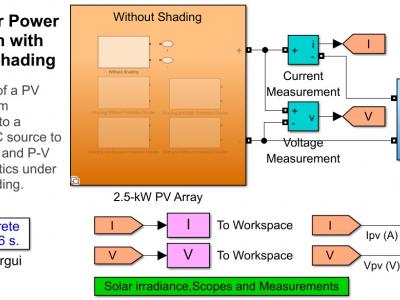Power Electronics

This dataset contains detailed technical specifications and market pricing information for power electronic components, specifically MOSFETs and IGBTs from two manufacturers: Wolfspeed and Hitachi. The data was collected through two main methods: manual upload of technical specifications in XML format from the manufacturers' official websites, and real-time market price aggregation using web scraping techniques from the Octopart platform, facilitated by Nexar APIs.
- Categories:
 115 Views
115 Views
Self-Aligning IPT Pads for Efficient High-Power Wireless Charging for EV
Introduction
- Categories:
 85 Views
85 Views
The aim of this paper is to propose a method of control of a universal input power source station for the production of electricity composed of conventional sources and renewable energy sources as well as a storage element.The development and the design of a three-phase grid connected inverter was studied. The research was able to reach its objectives by designing, modelling, analysis and simulations of the circuit using Psim software package that have helped to check the performance of the proposed control system.
- Categories:
 86 Views
86 Views
- Categories:
 32 Views
32 Views
This dataset contains the Matlab code of the nonlinear state-space model of a power electronics-dominated grid. A power grid with 3 grid following converters is taken under consideration, following the publication:
F. Cecati, R. Zhu, M. Liserre and X. Wang, "Nonlinear Modular State-Space Modeling of Power-Electronics-Based Power Systems," in IEEE Transactions on Power Electronics, vol. 37, no. 5, pp. 6102-6115, May 2022, doi: 10.1109/TPEL.2021.3127746.
Abstract of the paper:
- Categories:
 243 Views
243 Views
Health degradation issues in automotive power electronics converter systems (PECs) arise due to repetitive thermomechanical stress experienced during real-world vehicle operation. This stress, caused by heat generated during semiconductor operation within PECs, leads to the degradation of semiconductor's operating life. Estimating the power semiconductor junction temperature (Tj) is crucial for assessing semiconductor degradation in operation. Although physics-of-failure-based models can estimate Tj, they require substantial computational power.
- Categories:
 418 Views
418 Views
A PSCAD simulation model of direct-drive wind farm connected to the grid via VSC-HVDC is provided. Because there are a large number of power electronic devices and complex multi-time scale control links in the system, there is mutual coupling between power electronic devices or between power electronic devices and the power grid, which may lead to the risk of oscillation in the wide-band range from several hertz to hundreds of hertz.
- Categories:
 294 Views
294 Views<p>Abstract – This paper shows an overview of the recent developments in the field of Electric Vehicles (EVs), the integration of EVs and Smart Cars, the battery technology and the power electronics in EVs. Over the past decades, the automotive industry has faced growing challenges, including environmental concerns and the finite amount of fuel resources that mainly includes petrol and diesel. In response to these challenges, Electric Vehicles (EVs) have emerged as sustainable alternative, promising reduced emissions and increased energy efficiency.
- Categories:
 1714 Views
1714 ViewsDespite numerous advantages of space vector pulse width modulation (SVPWM) methods, their implementation on multilevel inverters (MLI) is onerous. Due to the ever-increasing use of MLIs in power electronic applications, it is essential to implement efficient modulation procedures aiming to keep control sampling periods sufficiently short. Here, a novel and straightforward SVPWM Strategy is introduced, which uses algebraic functions throughout the procedure and avoids using hardware-consuming trigonometric functions. Look-up tables and region detection are no more necessary.
- Categories:
 378 Views
378 Views

